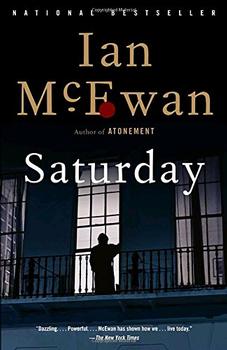Summary | Excerpt | Reading Guide | Reviews | Beyond the Book | Readalikes | Genres & Themes | Author Bio

Critics' Opinion:
Readers' Opinion:
First Published:
Mar 2005, 304 pages
Paperback:
Apr 2006, 304 pages
Standing here, as immune to the cold as a marble statue, gazing towards Charlotte Street, towards a foreshortened jumble of façades, scaffolding and pitched roofs, Henry thinks the city is a success, a brilliant invention, a biological masterpiece—millions teeming around the accumulated and layered achievements of the centuries, as though around a coral reef, sleeping, working, entertaining themselves, harmonious for the most part, nearly everyone wanting it to work. And the Perownes' own corner, a triumph of congruent proportion; the perfect square laid out by Robert Adam enclosing a perfect circle of garden—an eighteenth-century dream bathed and embraced by modernity, by street light from above, and from below by fibre-optic cables, and cool fresh water coursing down pipes, and sewage borne away in an instant of forgetting.
An habitual observer of his own moods, he wonders about this sustained, distorting euphoria. Perhaps down at the molecular level there's been a chemical accident while he slept—something like a spilled tray of drinks, prompting dopamine-like receptors to initiate a kindly cascade of intracellular events; or it's the prospect of a Saturday, or the paradoxical consequence of extreme tiredness. It's true, he finished the week in a state of unusual depletion. He came home to an empty house, and lay in the bath with a book, content to be talking to no one. It was his literate, too literate daughter, Daisy, who sent the biography of Darwin which in turn has something to do with a Conrad novel she wants him to read and which he has yet to start—seafaring, however morally fraught, doesn't much interest him. For some years now she's been addressing what she believes is his astounding ignorance, guiding his literary education, scolding him for poor taste and insensitivity. She has a point—straight from school to medical school to the slavish hours of a junior doctor, then the total absorption of neurosurgery training spliced with committed fatherhood—for fifteen years he barely touched a non-medical book at all. On the other hand, he thinks he's seen enough death, fear, courage and suffering to supply half a dozen literatures. Still, he submits to her reading lists—they're his means of remaining in touch as she grows away from her family into unknowable womanhood in a suburb of Paris; tonight she'll be home for the first time in six months—another cause for euphoria.
He was behind with his assignments from Daisy. With one toe occasionally controlling a fresh input of hot water, he blearily read an account of Darwin's dash to complete The Origin of Species, and a summary of the concluding pages, amended in later editions. At the same time he was listening to the radio news. The stolid Mr. Blix has been addressing the UN again—there's a general impression that he's rather undermined the case for war. Then, certain he'd taken in nothing at all, Perowne switched the radio off, turned back the pages and read again. At times this biography made him comfortably nostalgic for averdant, horse-drawn, affectionate England; at others he was faintly depressed by the way a whole life could be contained by a few hundred pages—bottled, like homemade chutney. And by how easily an existence, its ambitions, networks of family and friends, all its cherished stuff, solidly possessed, could so entirely vanish. Afterwards, he stretched out on the bed to consider his supper, and remembered nothing more. Rosalind must have drawn the covers over him when she came in from work. She would have kissed him. Forty-eight years old, profoundly asleep at nine thirty on a Friday night—this is modern professional life. He works hard, everyone around him works hard, and this week he's been pushed harder by a flu outbreak among the hospital staff—his operating list has been twice the usual length.
From Samurai William by Giles Milton. Copyright 2003. All rights reserved. No part of this book may be reproduced in any form without written permission from the publisher, Farrar, Straus and Giroux.




We've heard that a million monkeys at a million keyboards could produce the complete works of Shakespeare...
Click Here to find out who said this, as well as discovering other famous literary quotes!
Your guide toexceptional books
BookBrowse seeks out and recommends the best in contemporary fiction and nonfiction—books that not only engage and entertain but also deepen our understanding of ourselves and the world around us.